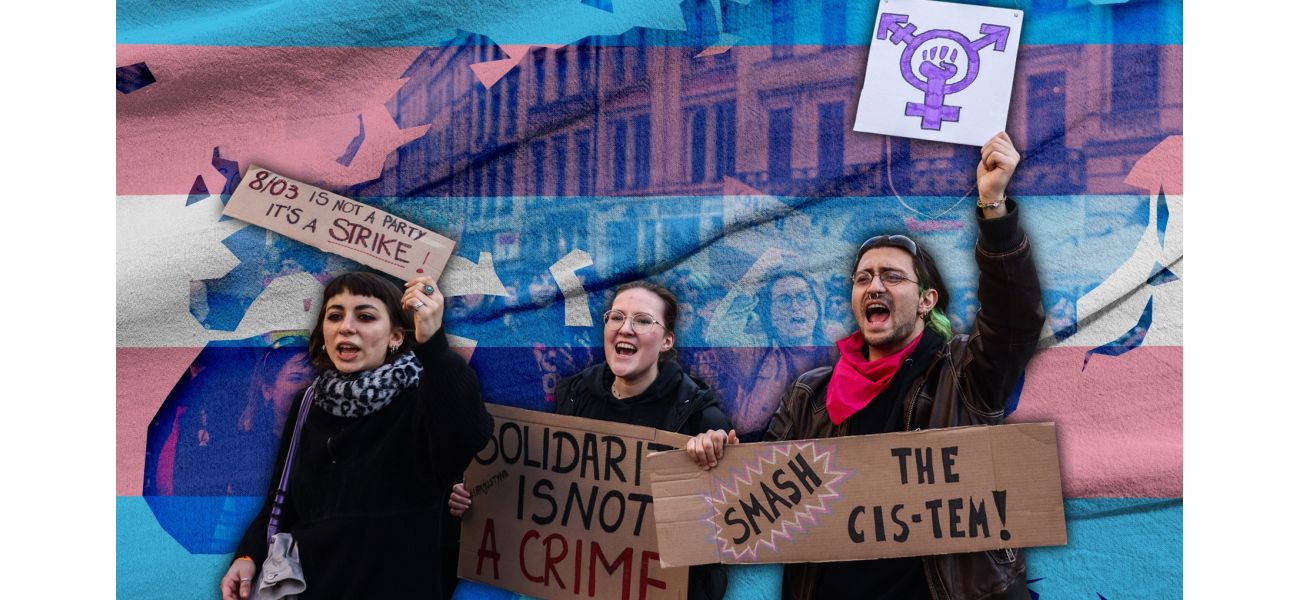Graphic displays most desirable and least desirable locations for transgender individuals in Europe and Central Asia.
A trans person in the top-ranked country expressed their love for being trans.
December 21st 2024.

According to a recent map, the state of trans rights in Europe and Central Asia is becoming increasingly divided. The map, created by TGEU, a campaign group advocating for trans rights, ranks the legal situation for trans individuals in 54 countries. The country that received the highest score this year is Iceland, making it one of the best places to openly identify as trans. This is a significant improvement from last year, where Iceland scored 26 out of 32 points and this year they have scored an impressive 30. On the other end of the spectrum, Russia holds the lowest rank, dropping from five points last year to a dismal zero this year.
The United Kingdom also saw a slight improvement, with a score of 15.25 points out of 32, compared to 14.25 last year. However, the biggest positive changes were seen in Greece and Czechia. In Greece, trans individuals are now protected against discrimination in education, healthcare, and housing. Similarly, Czechia introduced a law that protects trans asylum seekers. Despite these successes, TGEU notes that overall progress for trans rights has been uneven, with three times more points being removed this year compared to last year.
Some countries are taking steps to restrict gender care for young people, such as France where there is a call to ban hormonal therapy. On the other hand, there are countries where pro-trans policies have failed to become law, such as the Netherlands where an amendment allowing trans individuals to change their legal gender without medical approval was withdrawn. And in some countries, policies that were in place have been scrapped altogether, like in Slovakia where guidelines allowing legal gender changes without surgery were removed.
Turkey received one of the lowest scores, with only three points awarded. According to TGEU's research consultant Linn Julian Koletnik, this polarization in trans rights is evident in the extreme differences between the scores of Iceland and Russia. They emphasize that this polarization is not only limited to changes in these countries, but also reflects a lack of priority for trans rights in even progressive governments. This can lead to a polarized society where anti-equality and antidemocratic tendencies can grow unchecked.
The map also reveals some key findings, such as the fact that TGEU has been creating this map annually since 2013. They assess each country based on 32 indicators, ranging from legal gender recognition to healthcare access and family rights. While 40 out of 54 countries in Europe and Central Asia allow legal gender changes, TGEU believes this should be considered the bare minimum for trans individuals. On the other hand, Russia has removed this right entirely and is now joined by Hungary, Kyrgyzstan, and Bulgaria.
Only about half of the countries have laws protecting trans individuals from hate crimes, and 27 out of the 54 countries offer explicit protections for trans asylum seekers. Additionally, only ten countries have banned the harmful practice of conversion therapy. Malta and Iceland are the only two countries in Europe and Central Asia that have depathologized trans identities, meaning that being trans is not considered a medical or behavioral disorder. Koletnik also adds that while they do not expect any more countries to receive zero points, having a perfect score does not guarantee the safety of trans individuals either.
Unfortunately, despite these efforts, there have still been instances of violence against trans individuals. TGEU's Trans Murder Monitoring project found that eight trans, non-binary, or gender non-conforming people were killed in Europe this year. While this is eight less than last year, it is still concerning and does not align with the progress seen in legislation. Koletnik believes this highlights the fact that the everyday realities of trans individuals cannot be determined solely by legislation.
Kristmundur Pétursson, a 27-year-old trans man and vice-chair of Iceland's national queer association, Samtökin '78, is not surprised that Iceland ranks the highest in trans rights. He attributes this success to the unity within the country, both among trans and intersex activists and with the larger feminist movement. Pétursson also notes that the main gender law in Iceland was largely written by trans and intersex activists, showing the impact of their collaboration. On the other hand, he recognizes that in neighboring countries where this unity is lacking, it creates obstacles for all parties.
The United Kingdom also saw a slight improvement, with a score of 15.25 points out of 32, compared to 14.25 last year. However, the biggest positive changes were seen in Greece and Czechia. In Greece, trans individuals are now protected against discrimination in education, healthcare, and housing. Similarly, Czechia introduced a law that protects trans asylum seekers. Despite these successes, TGEU notes that overall progress for trans rights has been uneven, with three times more points being removed this year compared to last year.
Some countries are taking steps to restrict gender care for young people, such as France where there is a call to ban hormonal therapy. On the other hand, there are countries where pro-trans policies have failed to become law, such as the Netherlands where an amendment allowing trans individuals to change their legal gender without medical approval was withdrawn. And in some countries, policies that were in place have been scrapped altogether, like in Slovakia where guidelines allowing legal gender changes without surgery were removed.
Turkey received one of the lowest scores, with only three points awarded. According to TGEU's research consultant Linn Julian Koletnik, this polarization in trans rights is evident in the extreme differences between the scores of Iceland and Russia. They emphasize that this polarization is not only limited to changes in these countries, but also reflects a lack of priority for trans rights in even progressive governments. This can lead to a polarized society where anti-equality and antidemocratic tendencies can grow unchecked.
The map also reveals some key findings, such as the fact that TGEU has been creating this map annually since 2013. They assess each country based on 32 indicators, ranging from legal gender recognition to healthcare access and family rights. While 40 out of 54 countries in Europe and Central Asia allow legal gender changes, TGEU believes this should be considered the bare minimum for trans individuals. On the other hand, Russia has removed this right entirely and is now joined by Hungary, Kyrgyzstan, and Bulgaria.
Only about half of the countries have laws protecting trans individuals from hate crimes, and 27 out of the 54 countries offer explicit protections for trans asylum seekers. Additionally, only ten countries have banned the harmful practice of conversion therapy. Malta and Iceland are the only two countries in Europe and Central Asia that have depathologized trans identities, meaning that being trans is not considered a medical or behavioral disorder. Koletnik also adds that while they do not expect any more countries to receive zero points, having a perfect score does not guarantee the safety of trans individuals either.
Unfortunately, despite these efforts, there have still been instances of violence against trans individuals. TGEU's Trans Murder Monitoring project found that eight trans, non-binary, or gender non-conforming people were killed in Europe this year. While this is eight less than last year, it is still concerning and does not align with the progress seen in legislation. Koletnik believes this highlights the fact that the everyday realities of trans individuals cannot be determined solely by legislation.
Kristmundur Pétursson, a 27-year-old trans man and vice-chair of Iceland's national queer association, Samtökin '78, is not surprised that Iceland ranks the highest in trans rights. He attributes this success to the unity within the country, both among trans and intersex activists and with the larger feminist movement. Pétursson also notes that the main gender law in Iceland was largely written by trans and intersex activists, showing the impact of their collaboration. On the other hand, he recognizes that in neighboring countries where this unity is lacking, it creates obstacles for all parties.
[This article has been trending online recently and has been generated with AI. Your feed is customized.]
[Generative AI is experimental.]
0
0
Submit Comment





